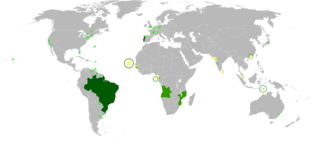
Count of Cantanhede was a Portuguese title of nobility created by a royal decree, dated from 6 August 1479, by King Afonso V of Portugal, and granted to D. Pedro de Menezes, 5th Lord of Cantanhede.

Portugal competed at the 1936 Summer Olympics in Berlin, Germany.
Hugo José Jorge O'Neill, 4th Viscount of Santa Mónica was the head of the Clanaboy O'Neill dynasty, whose family has been in Portugal since the 18th century.

The Portuguese Roman Catholic Diocese of Leiria–Fátima is a Latin rite suffragan diocese in the ecclesiastical province of the Metropolitan Patriarchate of Lisbon.

Marquis of Valença was a Portuguese title of nobility granted by royal decree of King Afonso V of Portugal, dated from October 11, 1451, to Dom Afonso of Braganza (1400–1460), who already was 4th Count of Ourém. It is the 1st Marquis title in Portugal.

Count of Vila Real was a Portuguese title of nobility created by a royal decree, in 1424, by King John I of Portugal, and granted to Dom Pedro de Menezes, also known as Peter I of Menezes, 1st Count of Viana.

Count of Valença was a Portuguese title of nobility, created by a royal decree, dated from July 20, 1464, by King Afonso V of Portugal, and granted to Dom Henrique de Menezes, who was already 3rd Count of Viana and 4th Count of Viana.

Marquess of Abrantes was a Portuguese title of nobility, granted by a decree issued by King John V of Portugal on 24 June 1718, to Rodrigo Anes de Sá Almeida e Menezes, 3rd Marquess of Fontes and 7th Count of Penaguião.

Count of Penaguião is a Portuguese title of nobility, created by King Philip I of Portugal, on 10 February 1583, for Dom João Rodrigues de Sá.

Marquis of Alorna was a Portuguese title of nobility granted, on 9 November 1748, by King John V of Portugal, to D. Pedro Miguel de Almeida Portugal e Vasconcelos, 3rd Count of Assumar and 44th viceroy of India.

Count of Vila Nova de Portimão was a Portuguese title of nobility granted on 28 May 1504, by King Manuel I of Portugal to D. Martinho de Castelo Branco, 2nd Lord of Vila Nova de Portimão.

Marquess of Lavradio is a title in the Peerage of Portugal created by Letters Patent of King José I of Portugal on 18 October 1753 for D. António de Almeida Soares de Portugal, 1st Count of Lavradio and 4th Count of Avintes.
The high office of Admiral of the Kingdom of Portugal as the head of the Portuguese navy was created by King Denis of Portugal in 1317 for the Genoese nobleman and naval officer Manuel Pessanha. Although there is evidence that such a title existed before, it seems to have been of only a temporary character, for fleets assembled in times of war. The exception was perhaps Nuno Fernandes Cogominho who seems to have been appointed admiral by King Denis in 1307, and still had that title at his death in 1316, although the conditions are unclear. Nonetheless, Manuel Pessanha was the first person known to hold the title of Almirante-mor as a permanent office for a permanent fleet. All the king's galleys were under his jurisdiction. The conditions of the Pessanha's title stipulated that he must maintain a corps of at least 20 Genoese naval officers at all times and was obliged to serve the king in military service on land as well as sea.
D. Lopo de Albuquerque was made First Count of Penamacor by King Afonso V of Portugal on August 24, 1476 by which letter the Count was also given the towns of Penamacor and Abiul.

The Forty Conspirators were a Portuguese nationalist group during the Iberian Union. The Conspirators were composed of forty men of the Portuguese nobility, and a large number of clergy and soldiers. Their goal was to depose the House of Habsburg king, Philip III.
The Captaincies of the Azores were the socio-political and administrative territorial divisions used to settle and govern the overseas lands of the Azores by the Kingdom of Portugal. These territories, a segment of the Captaincies of the Portuguese Empire, which usually conformed to the individual islands, allowing the stewardship of the King through the Donatary and Captaincy system.

The Manor of Lagares d'El-Rei, is a manor house on the Portuguese estate of Quinta dos Lagares d'El-Rei, part of the Senhorio dos Lagares d'El-Rei, a feudal fiefdom, seated in the civil parish of Alvalade, in the municipality of Lisbon.












